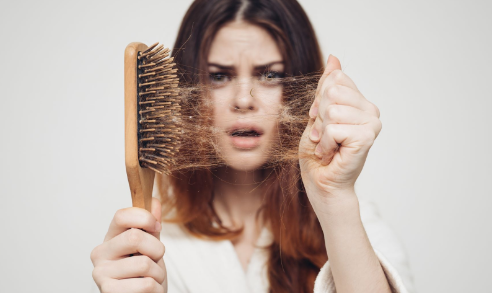The Connection Between Hormones and Hair Loss
UNDERSTANDING HAIR LOSS
The most prevalent kind of hair loss in both sexes is androgenetic alopecia, often known as female- or male-pattern baldness. A slow thinning of hair occurs as a result of this inherited condition; in men, this usually affects the crown and temples, and in women, the top of the scalp.
THE ROLE OF DIFFERENT HORMONES IN HAIR GROWTH
The human body contains more than 50 distinct hormones, but some are more closely related to hair growth and loss. Here’s a brief overview:
Androgens: This class of hormones, which includes testosterone, is mostly responsible for controlling the growth of hair. A specific androgen called dihydrotestosterone (DHT) is important in the process of androgenic alopecia, which causes hair loss. The effects of DHT, which adhere to hair follicles and cause them to exit the anagen growth phase, shrink, and eventually die, are more likely to cause androgenic alopecia in those with sensitive hair follicles.
Estrogen: By prolonging the anagen phase and preserving the thickness of the hair, estrogen, the principal female sex hormone, encourages hair growth. This may help to explain why, as estrogen levels drop after menopause, women frequently experience hair loss.
Thyroid Hormones: The hormones that control metabolism are produced by the thyroid gland. Hair loss may result from an overactive or underactive thyroid. Hyperthyroidism can result in excessive hair shedding, whereas hypothyroidism can cause thin, brittle hair.
Cortisol: When produced in excess, the stress hormone cortisol can cause hair loss. Hair thinning or loss can result from the disruption of the hair growth cycle caused by increased cortisol levels and chronic stress.
HORMONAL CONDITIONS AND HAIR LOSS
Several illnesses can result in hair loss as a direct or secondary consequence of hormonal fluctuations, including:
Androgenetic Alopecia: The most prevalent type of hair loss is androgenetic alopecia, also referred to as male or female pattern baldness. It is mostly brought on by a genetic inclination that causes hair follicles to become more sensitive to androgens, particularly dihydrotestosterone (DHT), which causes hair to gradually thin.
Polycystic Ovary Syndrome (PCOS): is a hormonal condition that primarily affects women. It is typified by an overabundance of androgens, which can cause irregular menstruation periods, excessive facial hair growth, and hair thinning.
Peri/Menopause: The dramatic decrease in estrogen levels that occurs during menopause causes alterations in the pattern of hair development. This frequently leads to decreased hair density and thinning.
Pregnancy: A lot of women lose their hair either during or after getting pregnant. Hormonal variations are frequently the main cause of this.
MANAGING HORMONAL-RELATED HAIR LOSS
If you believe that hormone abnormalities are the root of your hair loss, we can run tests to find out how much hormone you are producing and suggest the best course of action. The following are some typical methods for treating hair loss caused by hormones:
Hormone Replacement Therapy (HRT): When hormone levels are out of balance, particularly during menopause or in situations of thyroid-related hair loss, HRT may be prescribed.
Medication: By addressing hormonal variables, FDA-approved drugs like finasteride and minoxidil can help slow or reverse hair loss.
Lifestyle Adjustments: Stress reduction methods, a healthy diet, and frequent exercise can support the health of your hair and preserve hormonal balance.
Topical therapies: Topical therapies that include growth factors or other active components can help the hair follicles function better overall and promote hair growth. We use exosomes, mesotherapy, and plant based growth serums to encourage natural growth.
Low-Level Laser Therapy (LLLT): Following the correction of any hormone imbalances, LLLT can aid in the stimulation of hair regeneration.
What can you do next?
Understanding the complex relationship between hormones and hair loss is essential for managing hair loss effectively. People can reduce hair loss and, in certain situations, encourage hair regeneration by treating hormone imbalances and getting professional advice.
Keep in mind that a variety of causes can contribute to hair loss and that the best results are frequently obtained via a holistic approach to treatment.
We hope this blog has helped you learn more about the connection between hormones and hair loss, and if you have more questions, we’d love to hear from you. Schedule a consultation with our team of experts at Potentia MedSpa in Lafayette, California or call us at 510 230 2282. We are the only Functional Aesthetics Medspa in the San Francisco Bay Area offering a combination of medical expertise, innovative technology in skin care and holistic support.

